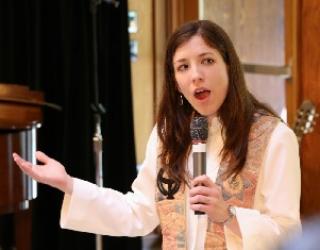Beyond the Cliff and the Bridge: Keeping UU Youth Connected

by Rev. Annie Gonzalez Milliken
“Where have you been all my life?” and “You were here all my life, now where are you?” are two common questions I hear asked about Unitarian Universalism. The first is asked by adult seekers who wish they’d found us sooner. The second is asked by people raised UU who can’t find engaging UU community after aging out of youth programming.
These questions have serious implications for Unitarian Universalists everywhere. How can we become more visible so we can change more lives? How can we make ourselves present to our young adults so they can continue their faith formation?
I think about these questions constantly in my role as Young Adult and Campus Ministry Associate. Unitarian Universalism’s statistics for serving emerging adults (18-24) are pretty terrible, as they are today for many religious traditions. To know that we are underserving emerging adults breaks my heart. Tons of transition, the stressors of the economic, social and personal challenges of adulthood, not to mention questions of identity and relationships—they need us. And we need them to make our faith more whole!
So what can we do? Specifically for this blogpost, what can religious educators do about that second question, about making ourselves present to homegrown UU emerging adults?
First, I recommend watching this Prezi, “The cliff, the bridge and beyond in Unitarian Universalism.” It’s a visual presentation; click through by pushing the forward-facing arrow at the bottom of the presentation. (Click slowly if you get dizzy easily!) The Prezi gives lots of tips on how folks can support our emerging adults in staying connected with Unitarian Universalism. If you are a UU religious educator, you very likely have unique opportunities. Can you implement some of the suggestions in the Prezi, and below?
Next Steps!
Get youth thinking about their UU future and start young. Does your UU faith community have a Coming of Age program for middle-schoolers? This is a great time to remind youth that there are many ways to be UU as an adult. Encourage youth to think about how they might stay connected to UU as they grow older: by keeping in touch with their home congregation; joining virtual UU community; being part of a campus ministry, young adult group, congregation, or other ministry; or serving our faith as an RE teacher, worship leader, or district or even national leader.
Encourage the congregation to intentionally stay in touch with youth alumni. Sending care packages, hosting reunions, and inviting youth alumni into congregational leadership are great ways to stay connected! If your community has the resources to start a small task force to focus on this type of connection, give them some encouragement!
Be a voice for emerging adult inclusion. Whenever your community is planning events or religious education classes, think about ways to reach out to and include emerging adults. Offering rides, hosting events that are accessible by public transit, and thinking outside the weekday 9-to-5 work schedule are strategies that will not only help emerging adults, but also can be great for low income folks and also for aging members who can benefit from rides and often prefer daytime events.
Pay attention to local campuses, even if you can’t start a group there. Starting a campus ministry can be a wonderful rewarding form of missional work! Some UU communities just don’t have the volunteer and/or financial resources to do that, yet there are many good ways to connect even if you can’t sustain an ongoing campus organization. But that doesn’t mean you should ignore local campuses! Let their office of religious life (or equivalent) know about your UU faith community. Networking with their queer student groups and any other progressive organizations. Use faculty and staff connections in your congregation. Target publicity on or near campus.
Affirm non-congregational ways of being UU. Personally I love UU congregations. I’ve been involved with seven different congregations in my life and each one has been vital to my professional and faith formation. However, I also know that many folks, especially emerging adults, find UU sustenance outside of congregations: in camps, conferences, virtual communities, informal communities, non-congregational ministries, etc. It’s important that we who are involved with congregations validate these ways of engaging with our faith so that emerging adults don’t feel like “illegitimate” UUs.
As congregational leaders and as professionals tasked with faith formation, religious educators have a special role to play in making our Unitarian Universalist communities welcoming for emerging adults. Ultimately, however, this work belongs to all of us, of all ages and all roles. To truly change the landscape of Unitarian Universalism into one where youth find the transition to UU young adult life meaningful and do-able we all need to work together, taking small steps wherever we are, whenever we can. Let’s make our faith movement more whole. Let’s try to serve more of our beloved homegrown UUs as they make their way in the world.
About the Blogger
The Rev. Annie Gonzalez Milliken is a lifelong Unitarian Universalist from the Midwest who currently serves as the Young Adult and Campus Ministry Associate for the Unitarian Universalist Association. She recently moved to Boston with her partner, Lucas, and they have been happily involved with The Sanctuary Boston and, more recently, First Parish Dorchester.